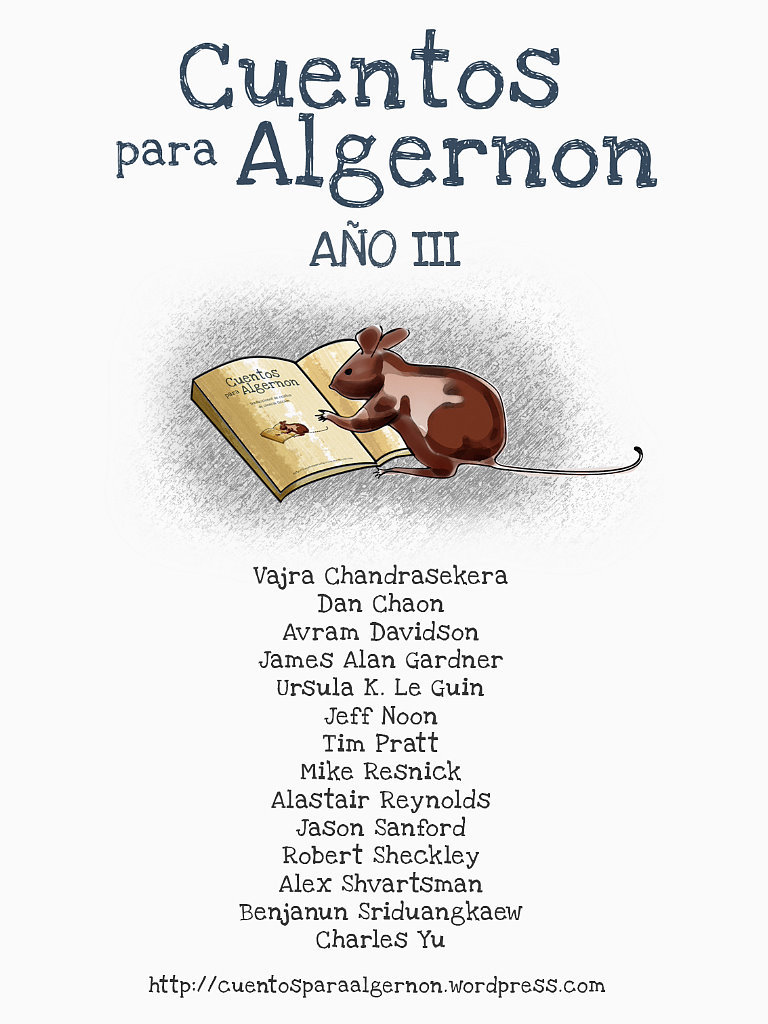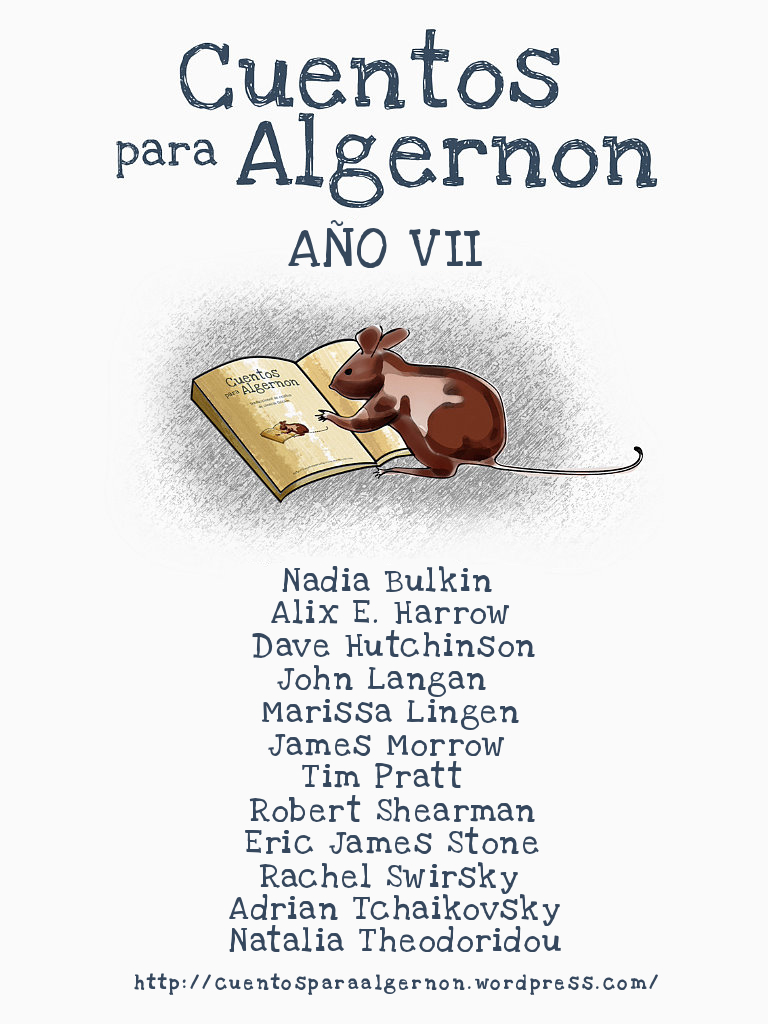
Part of Series
Ya está aquí Cuentos para Algernon: Año III, antología que recoge la totalidad de los textos publicados en el blog durante su tercer año de vida y, que como las recopilaciones anteriores, puede descargarse íntegra y gratuitamente en los formatos habituales para e-book que se ofrecen en este blog. Cuentos para Algernon AÑO III Relatos . La fijación, de Alastair Reynolds . El hornillo eslovo, de Avram Davidson . Aciago encuentro en Ulthar, de Tim Pratt . Cthulhu explicado a la yaya, de Alex Shvartsman . Tres vistas sobre la existencia de culebras en el torrente sanguíneo humano, de James Alan Gardner . Re: Re: Re: Re: Re: El microondas de la sala-comedor está haciéndole cosas raras al tejido del espacio-tiempo, de Charles Yu . Puente Silencioso, Cascada Pálida, de Benjanun Sriduangkaew . ¡Menudas cosas hace la gente!, de Robert Sheckley . La llave del gabinete de la noche, de Jeff Noon . Ulder, de Vajra Chandrasekera . Las abejas, de Dan Chaon . Aquí andamos, cayendo en las sombras, de Jason Sanford . El Emporio de las Maravillas de Alastair Baffle, de Mike Resnick Ensayo . Un mensaje sobre los mensajes, de Ursula K. Le Guin
Authors



Raised in Simcoe and Bradford, Ontario, James Alan Gardner earned Bachelor's and Master's degrees in Applied Mathematics from the University of Waterloo. A graduate of the Clarion West Fiction Writers Workshop, Gardner has published science fiction short stories in a range of periodicals, including The Magazine of Fantasy and Science Fiction and Amazing Stories. In 1989, his short story "Children of the Creche" was awarded the Grand Prize in the Writers of the Future contest. Two years later his story "Muffin Explains Teleology to the World at Large" won an Aurora Award; another story, "Three Hearings on the Existence of Snakes in the Human Bloodstream," won an Aurora and was nominated for both the Nebula and Hugo Awards. He has written a number of novels in a "League of Peoples" universe in which murderers are defined as "dangerous non-sentients" and are killed if they try to leave their solar system by aliens who are so advanced that they think of humans like humans think of bacteria. This precludes the possibility of interstellar wars. He has also explored themes of gender in his novels, including Commitment Hour in which people change sex every year, and Vigilant in which group marriages are traditional. Gardner is also an educator and technical writer. His book Learning UNIX is used as a textbook in some Canadian universities. A Grand Prize winner of the Writers of the Future contest, he lives with his family in Waterloo, Ontario.

I'm Al, I used to be a space scientist, and now I'm a writer, although for a time the two careers ran in parallel. I started off publishing short stories in the British SF magazine Interzone in the early 90s, then eventually branched into novels. I write about a novel a year and try to write a few short stories as well. Some of my books and stories are set in a consistent future named after Revelation Space, the first novel, but I've done a lot of other things as well and I like to keep things fresh between books. I was born in Wales, but raised in Cornwall, and then spent time in the north of England and Scotland. I moved to the Netherlands to continue my science career and stayed there for a very long time, before eventually returning to Wales. In my spare time I am a very keen runner, and I also enjoying hill-walking, birdwatching, horse-riding, guitar and model-making. I also dabble with paints now and then. I met my wife in the Netherlands through a mutual interest in climbing and we married back in Wales. We live surrounded by hills, woods and wildlife, and not too much excitement.


Jeff Noon is a novelist, short story writer and playwright whose works make extensive use of wordplay and fantasy.He studied fine art and drama at Manchester University and was subsequently appointed writer in residence at the city's Royal Exchange theatre. But Noon did not stay too long in the theatrical world, possibly because the realism associated with the theatre was not conducive to the fantastical worlds he was itching to invent. While working behind the counter at the local Waterstone's bookshop, a colleague suggested he write a novel. The result of that suggestion, Vurt, was the hippest sci-fi novel to be published in Britain since the days of Michael Moorcock in the late sixties. Like Moorcock, Noon is not preoccupied with technology per se, but incorporates technological developments into a world of magic and fantasy. As a teenager, Noon was addicted to American comic heroes, and still turns to them for inspiration. He has said that music is more of an influence on his writing than novelists: he 'usually writes to music', and his record collection ranges from classical to drum'n'bass.

Jason Sanford is three-time finalist for the Nebula Award and an active member of the Science Fiction and Fantasy Writers of America. Born and raised in the American South, he currently lives in the Midwestern U.S. His life's adventures include work as an archaeologist and as a Peace Corps Volunteer. Jason's first novel Plague Birds will be released by Apex Books in September 2021. He has published dozens of short stories in Asimov's Science Fiction, Interzone, Analog: Science Fiction and Fact, Beneath Ceaseless Skies, Fireside Magazine, and other places. Books containing his stories include multiple "year's best" story collections and The New Voices of Science Fiction. Jason’s awards and honors include being a finalist for the Nebula Awards for Best Novella, Best Novelette and Best Short Story. He has also won two Interzone Readers' Polls for best story of the year and been a co-winner of a third Poll. Jason's other honors include receiving a Minnesota State Arts Board Fellowship, being nominated for the BSFA Award, and being longlisted for the British Fantasy Award. His stories have been named to multiple Locus Recommended Reading Lists along with being translated into a number of languages including Chinese, Spanish, French, Russian, Polish, Hungarian, Italian and Czech.

Alex Shvartsman is a writer, editor, and translator from Brooklyn, NY. He's the author of The Middling Affliction (2022) and Eridani's Crown (2019) fantasy novels. Kakistocracy, a sequel to The Middling Affliction, is forthcoming in 2023. Over 120 of his stories have been published in Analog, Nature, Strange Horizons, and many other venues. He won the 2014 WSFA Small Press Award for Short Fiction and was a two-time finalist (2015 and 2017) for the Canopus Award for Excellence in Interstellar Fiction. His collection, Explaining Cthulhu to Grandma and Other Stories and his steampunk humor novella H. G. Wells, Secret Agent were published in 2015. His second collection, The Golem of Deneb Seven and Other Stories followed in 2018. Alex is the editor of over a dozen anthologies, including the Unidentified Funny Objects annual anthology series of humorous SF/F.



Ursula K. Le Guin published twenty-two novels, eleven volumes of short stories, four collections of essays, twelve books for children, six volumes of poetry and four of translation, and has received many awards: Hugo, Nebula, National Book Award, PEN-Malamud, etc. Her recent publications include the novel Lavinia, an essay collection, Cheek by Jowl, and The Wild Girls. She lived in Portland, Oregon. She was known for her treatment of gender (The Left Hand of Darkness, The Matter of Seggri), political systems (The Telling, The Dispossessed) and difference/otherness in any other form. Her interest in non-Western philosophies was reflected in works such as "Solitude" and The Telling but even more interesting are her imagined societies, often mixing traits extracted from her profound knowledge of anthropology acquired from growing up with her father, the famous anthropologist, Alfred Kroeber. The Hainish Cycle reflects the anthropologist's experience of immersing themselves in new strange cultures since most of their main characters and narrators (Le Guin favoured the first-person narration) are envoys from a humanitarian organization, the Ekumen, sent to investigate or ally themselves with the people of a different world and learn their ways.

